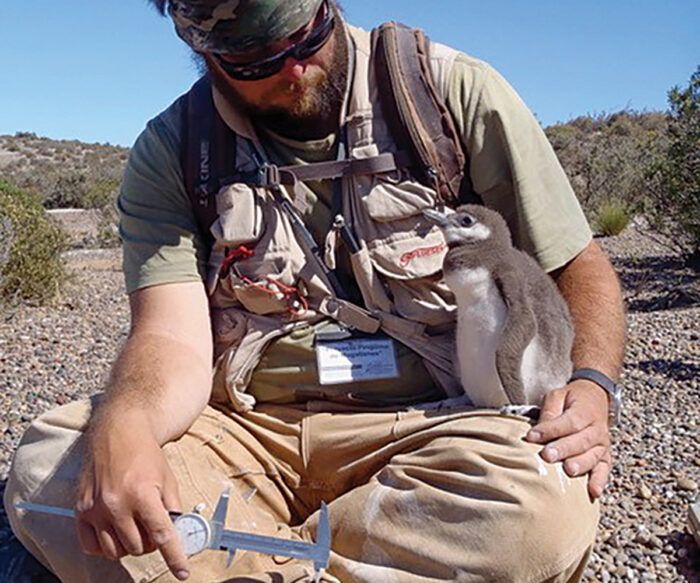Synopsis: From studying penguins in Patagonia to building furniture in Seattle, the arc of Jack Cerchiara’s career has been long. He owes his woodworking success to lessons learned from a career in science.
What was my preparation for a career making fine furniture? Studying penguins. I did my field work in Patagonia, hiking many miles daily to track, weigh, and measure penguins, from newly hatched chicks to adults 35 years old. And I spent countless hours in the lab analyzing samples and data and writing up research. When I finished my PhD in biology, I had completed nearly seven years of study and research on the DNA of Magellanic penguins. Then I entered my fellowships—more study and research. To unwind in off hours, I began to delve into woodworking.
Making small pieces for my family and for friends, I dove headlong back into a hobby I’d first taken up in high school. One piece for a friend turned into pieces for more friends…and then their friends. There were soon enough projects to keep me busy most nights and weekends. I experienced such excitement, challenge, and joy in furniture making that I decided to leave my career in science and open Salish Sea Woodworks full time, building handcrafted, fine hardwood furniture.
My origin story as a woodworker may seem like a sharp turn from academics, but there are things I learned in my scientific career that couldn’t be more at home in woodworking. I often reflect on three lessons in particular.
1. Never turn away from a problem, especially one for which you don’t have an answer
My academic mentor used to tell me that being a scientist really isn’t about being smart, it’s about “stick-to-itiveness.” For a biologist, pursuing challenging problems is a regular occurrence, and with that pursuit comes the excitement of discovery; but also feelings of uncertainty, failure, imposter syndrome.
As a self-taught woodworker, I found similar challenges. But I’ve always believed in a growth mindset: That in woodworking, as in science, with enough research, practice, and effort, most things can be learned and mastered. I was willing to pour myself entirely into the craft. Early on, I accepted nearly every project I was asked to build, and I learned by doing. I found that when I committed to this approach, I was able to find more joy in the challenges, more lessons from the failures, and more satisfaction from my time at the workbench.
2. Always be a student
There’s a common misconception that experts in a field have the answer to everything, that having attained the pinnacle of knowledge, they are infallible. My experience indicates the opposite. I’ve been in the room with some of the world’s leading experts, literal Nobel Prize winners. What set them apart was humility about the limits of their knowledge, acceptance that there was so much more to learn, and excitement about the unknown.
I try to approach woodworking in a similar way, remembering that whatever understanding I gain or techniques I master, there is so much more to learn, and so much I am green toward. I am excited to be a “forever student.” Working this way has made me more excited about my accomplishments, more passionate about pushing myself to try new techniques, designs or joinery, and more accepting of my failures.
3. Care about your impact
A scientist once said to me, “In order to make a difference, you need to focus on your impact on two things: the environment, and people.”
Much of my work in academia supported conservation science, protecting ecosystems, habitats, and species. Now, in my woodworking, I embrace the same principles, seeking out locally sourced lumber and natural finishes, and endeavoring to build pieces that stand the test of time. Working with a beautiful natural resource, I’m committed to protecting it and the habitat in which it grows and to being thoughtful about its harvest.
In science, every discovery is cradled in the foundation of those who came before. When I began woodworking, I thought of it as a solo endeavor. But what I found instead is that, as in science, no journey of discovery in woodworking is without a community. In my time learning and growing as a maker, I have received guidance, inspiration, and support in a community of passionate craftspeople. A number of wonderful woodworkers have been virtual mentors for me; they have no idea how much impact they’ve had on my craft and career. I hope that as part of this community, I too can help others find joy and inspiration in woodworking.
Jack A. Cerchiara works wood in Seattle.
Photo courtesy of the author








